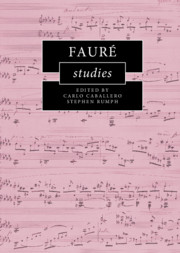Book contents
- Fauré Studies
- Cambridge Composer Studies
- Fauré Studies
- Copyright page
- Dedication
- Contents
- Figures
- Tables
- Music Examples
- Contributors
- Acknowledgments
- Looking Back on a Journey
- 1 Patrons and Society
- 2 Keys to the Ineffable in Fauré
- 3 Fauré as Student and Teacher of Harmony
- 4 Romancing the mélodie, or Generic Play in the Early Hugo Settings
- 5 Lux aeterna
- 6 From Homer’s Banquet to Fauchois’ Feast
- 7 Orchestral Melody in Pénélope
- 8 Fauré the Practical Interpreter
- 9 Fauré, Orientalism, and Le voile du bonheur
- 10 Jankélévitch, Fauré, and the Thirteenth Nocturne
- Index
3 - Fauré as Student and Teacher of Harmony
Published online by Cambridge University Press: 17 April 2021
- Fauré Studies
- Cambridge Composer Studies
- Fauré Studies
- Copyright page
- Dedication
- Contents
- Figures
- Tables
- Music Examples
- Contributors
- Acknowledgments
- Looking Back on a Journey
- 1 Patrons and Society
- 2 Keys to the Ineffable in Fauré
- 3 Fauré as Student and Teacher of Harmony
- 4 Romancing the mélodie, or Generic Play in the Early Hugo Settings
- 5 Lux aeterna
- 6 From Homer’s Banquet to Fauchois’ Feast
- 7 Orchestral Melody in Pénélope
- 8 Fauré the Practical Interpreter
- 9 Fauré, Orientalism, and Le voile du bonheur
- 10 Jankélévitch, Fauré, and the Thirteenth Nocturne
- Index
Summary
Understanding the training of professional musicians in nineteenth-century France may require some conceptual adjustments. Words that seem to mean one thing for us today can actually have meant something rather different then. Accompagnement, for instance, meant practical keyboard harmony and thoroughbass, harmonie meant practical counterpoint, and contrepoint meant imitative counterpoint in the form of fugues and canons. As we shall see below, when Gabriel Fauré wrote a harmony exercise in which he provided the bass and a student was to add the implied tenor, alto, and soprano voices, he intended it to be completed as an informal type of fugue, the locus classicus of counterpoint. “Counterpoint” was a word deeply rooted in the practices of trained medieval monks who could improvise a series of points (= notes) against (Lat. contra) the notes of a Gregorian chant.
Keywords
- Type
- Chapter
- Information
- Fauré Studies , pp. 59 - 79Publisher: Cambridge University PressPrint publication year: 2021

